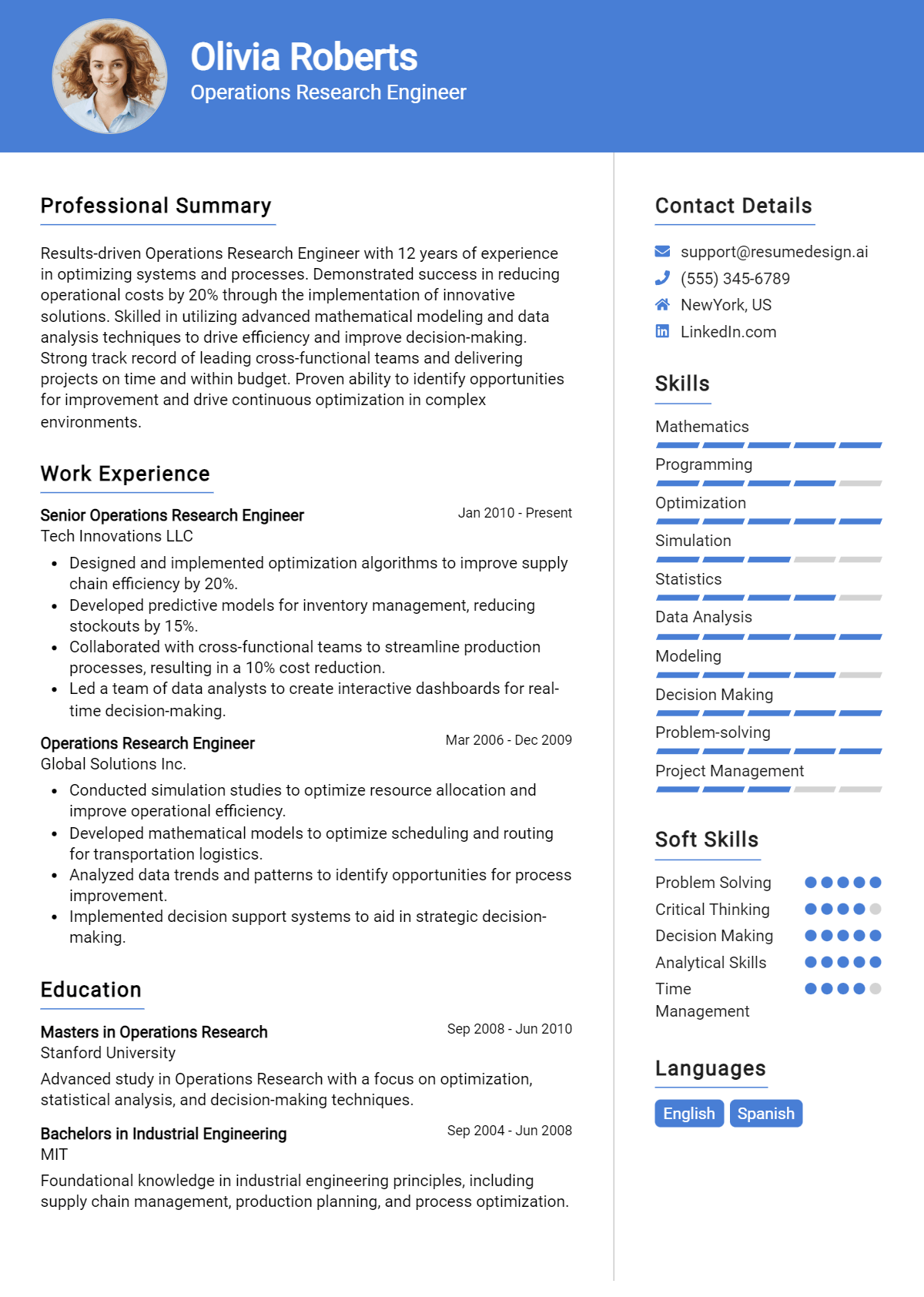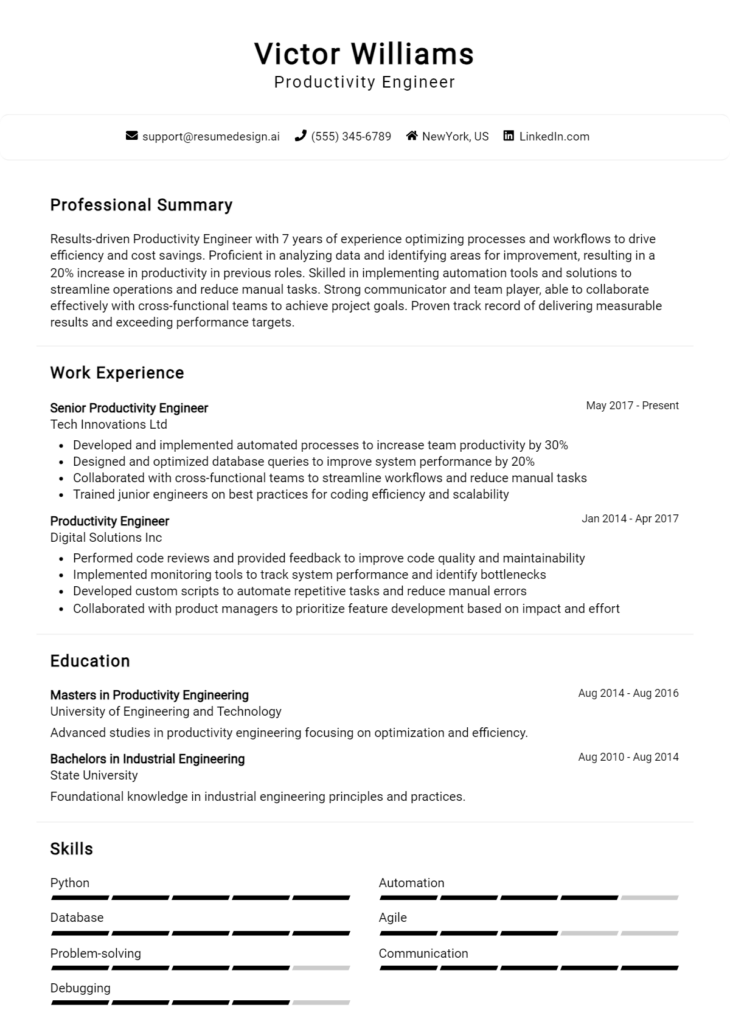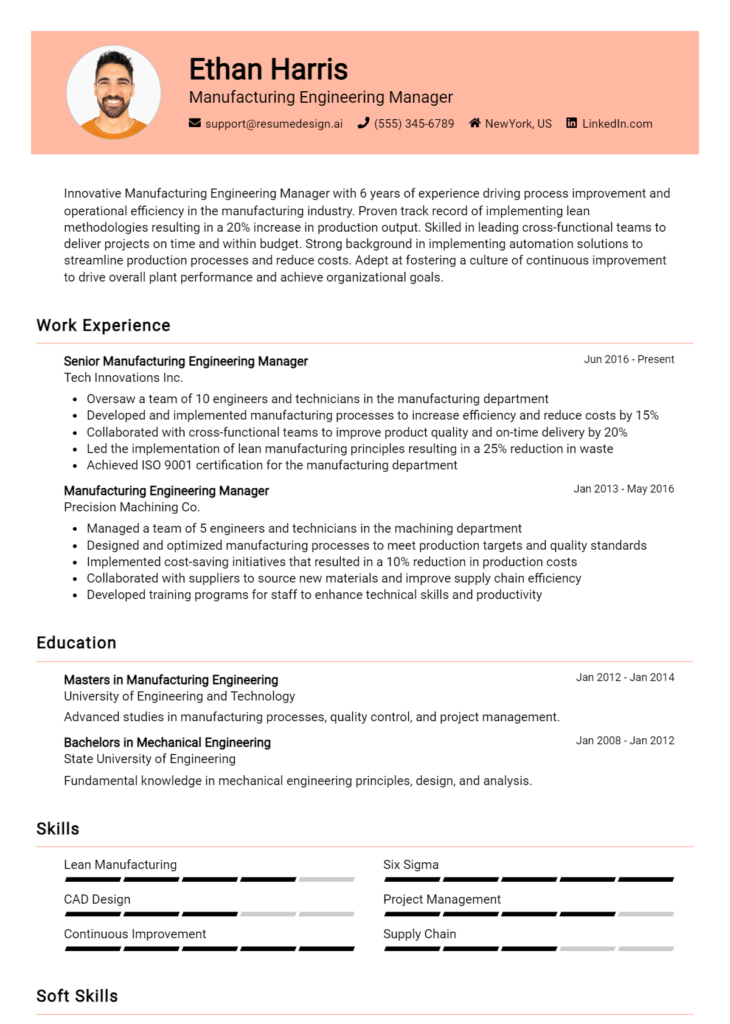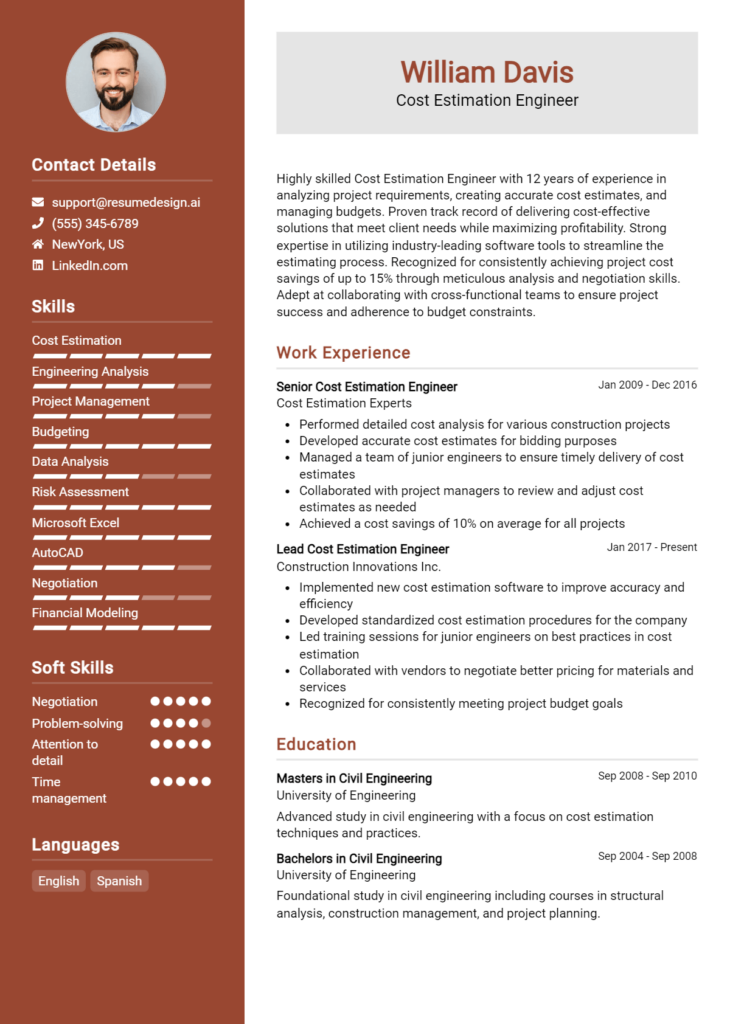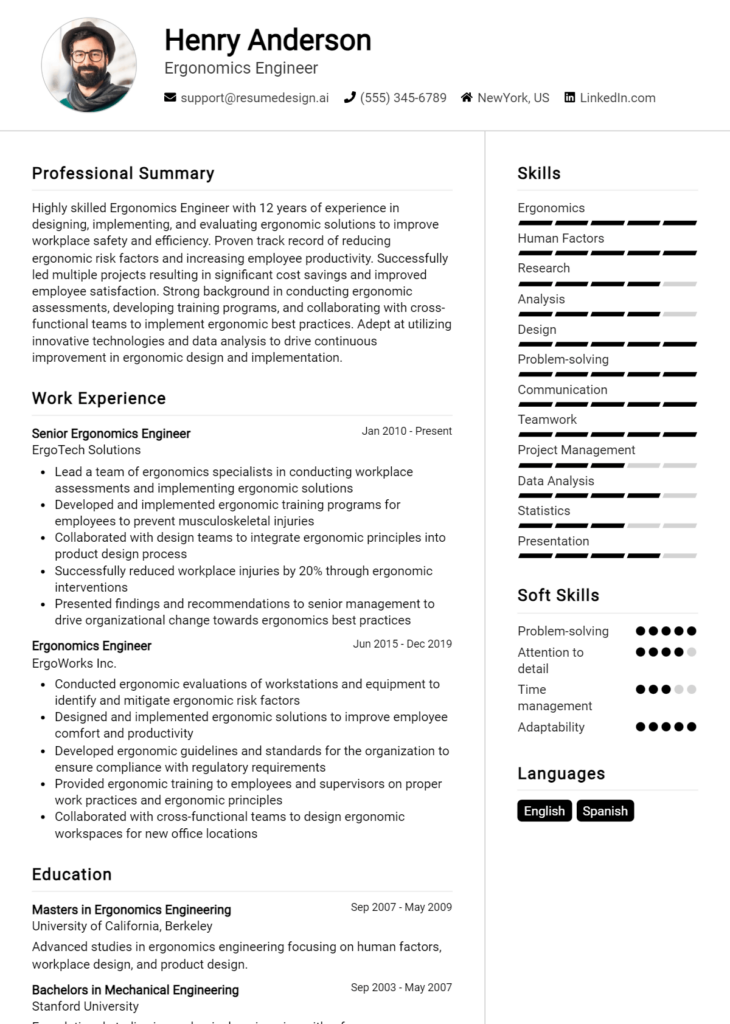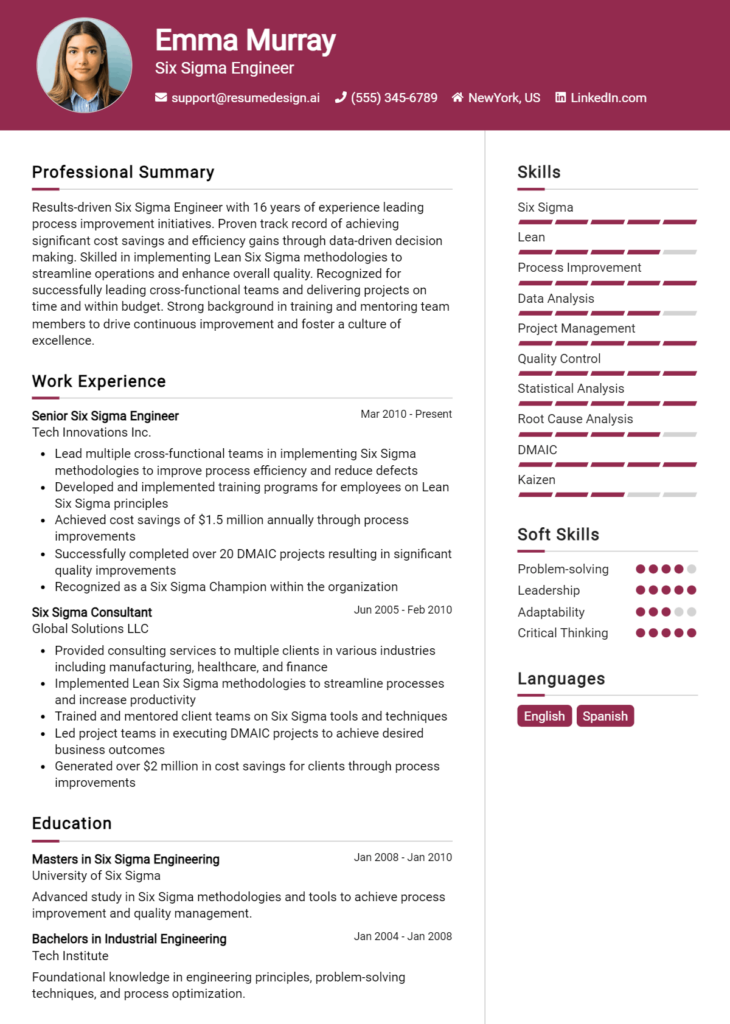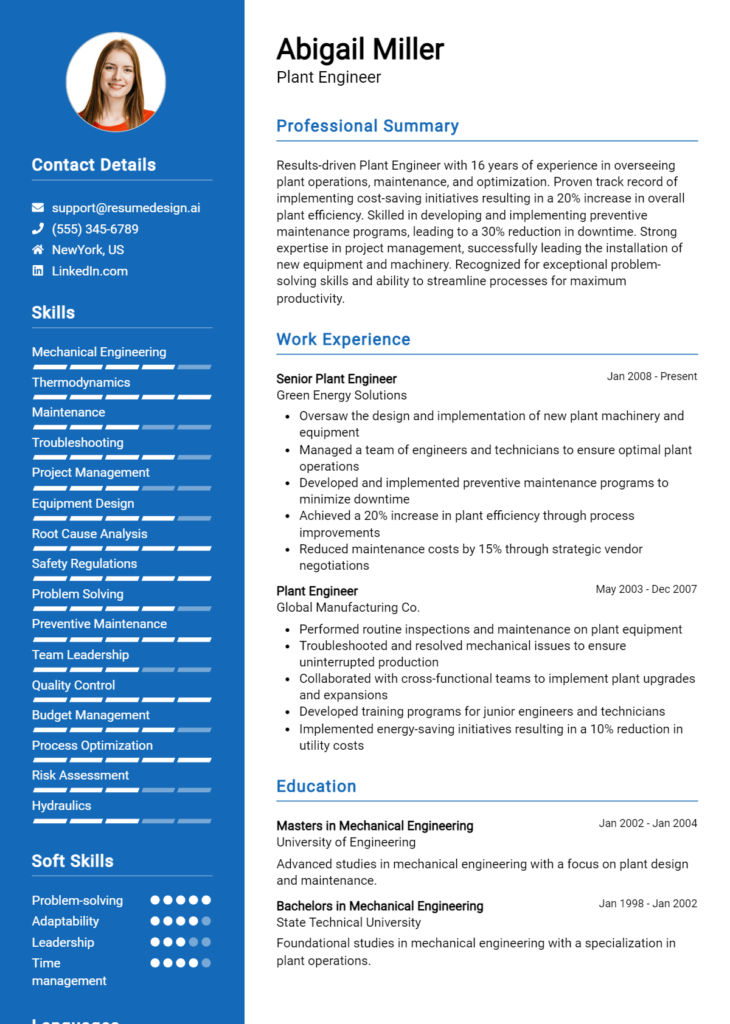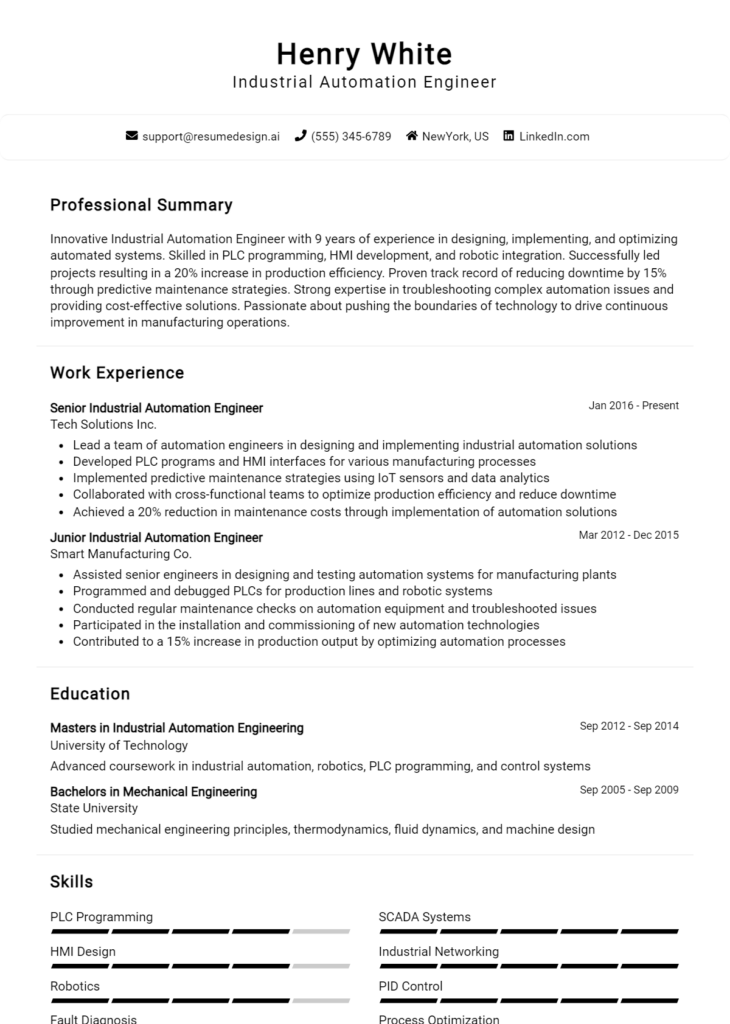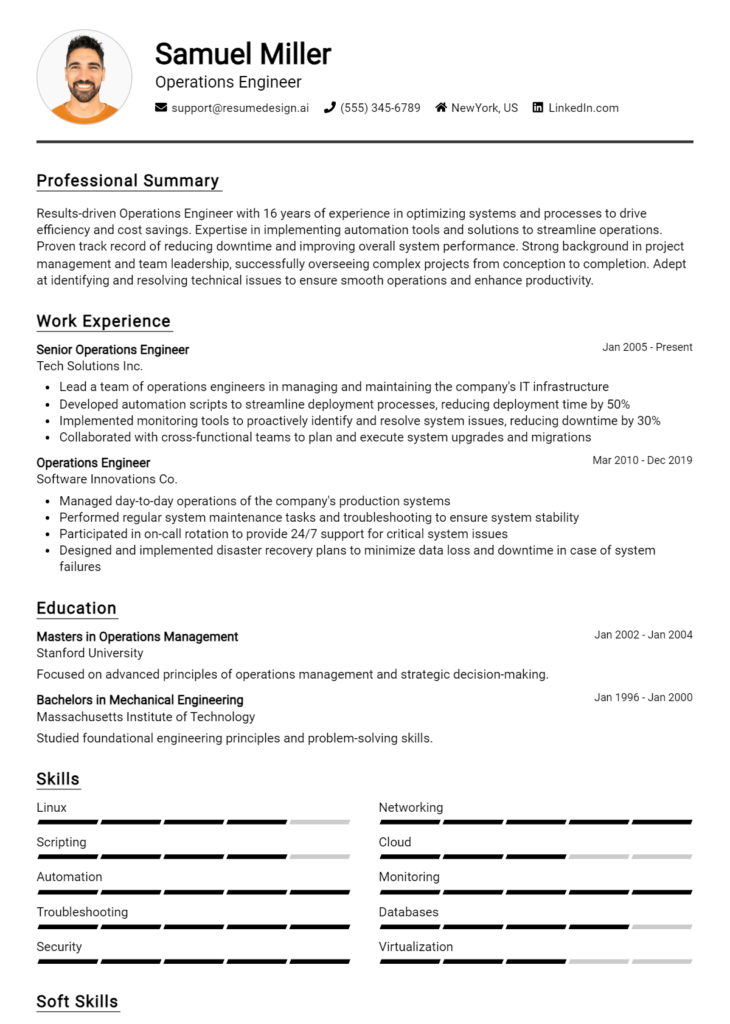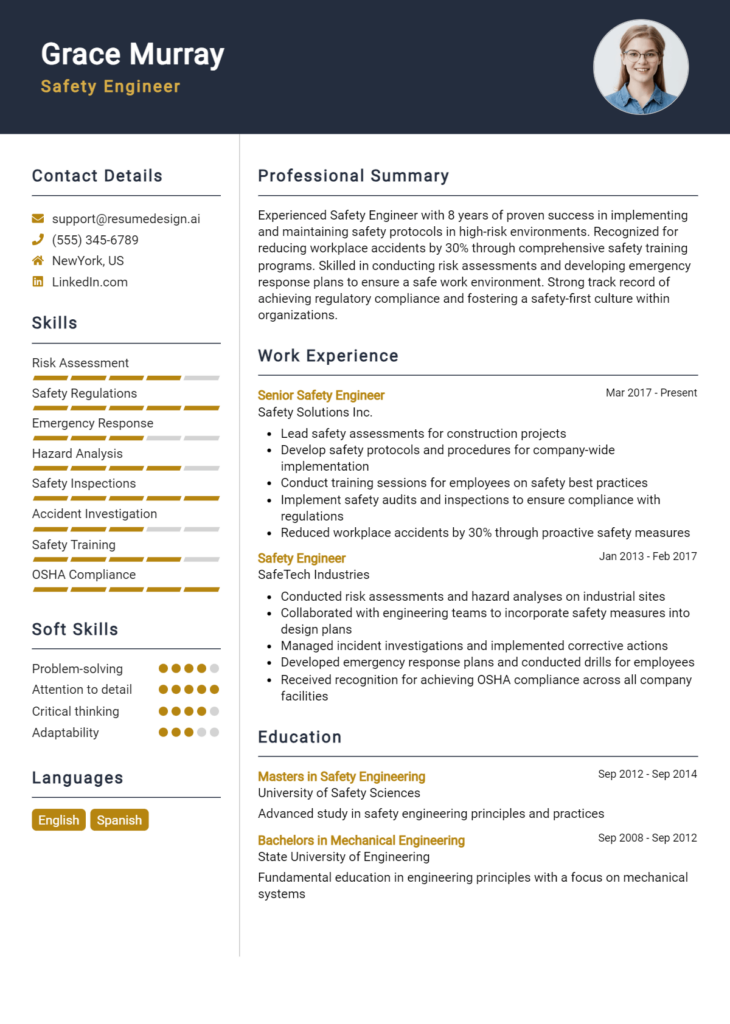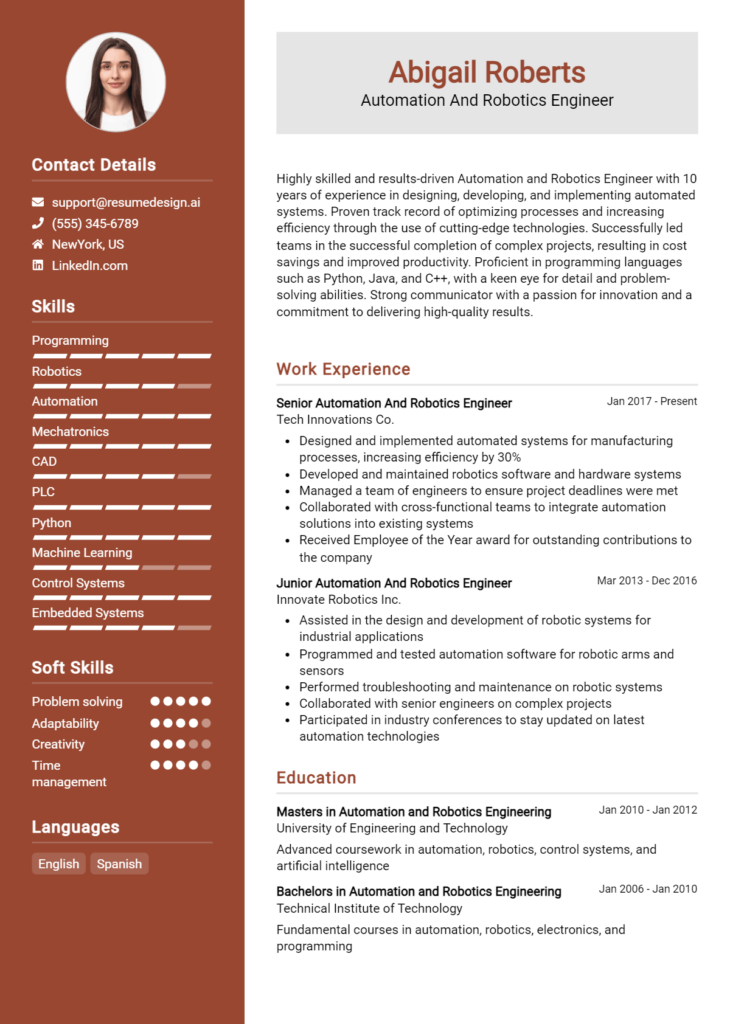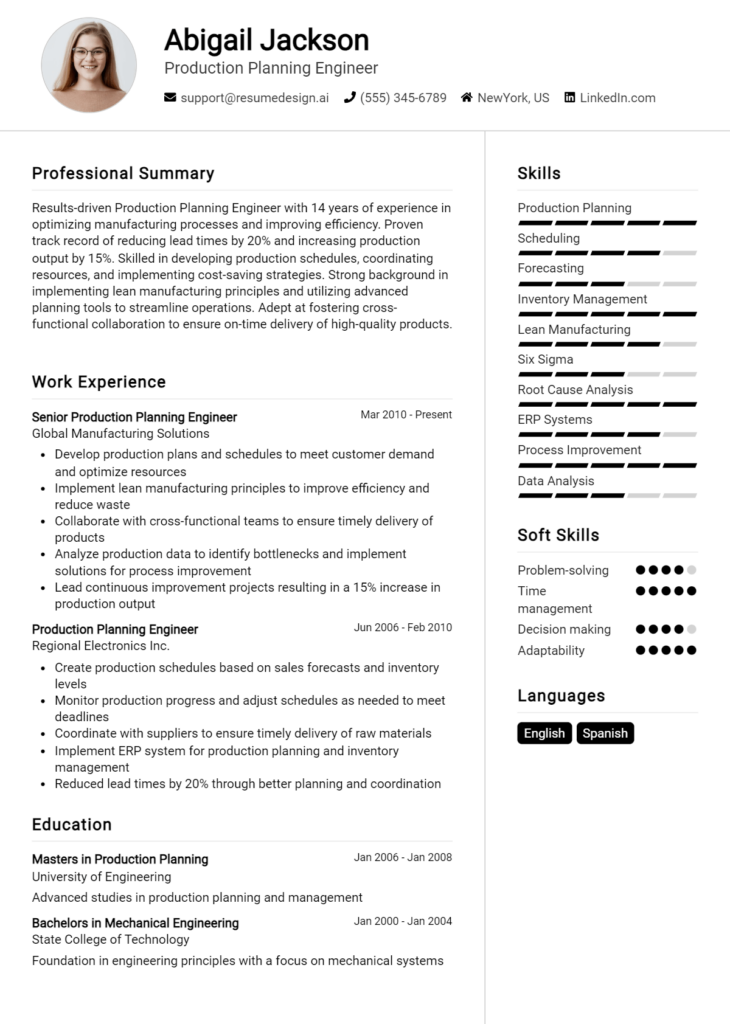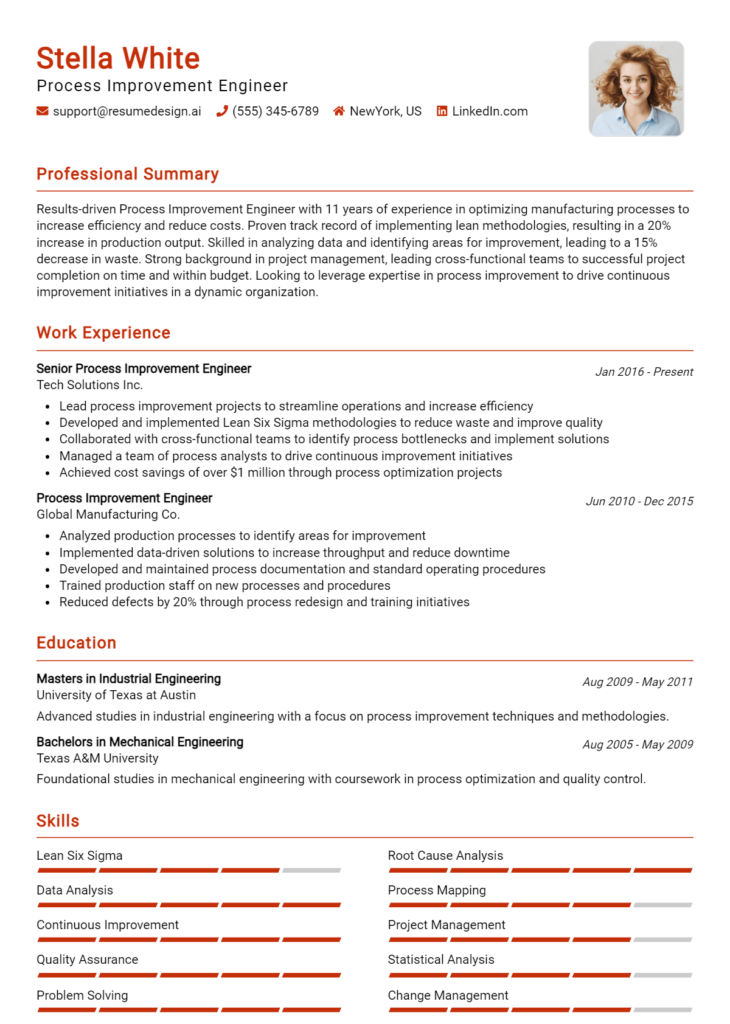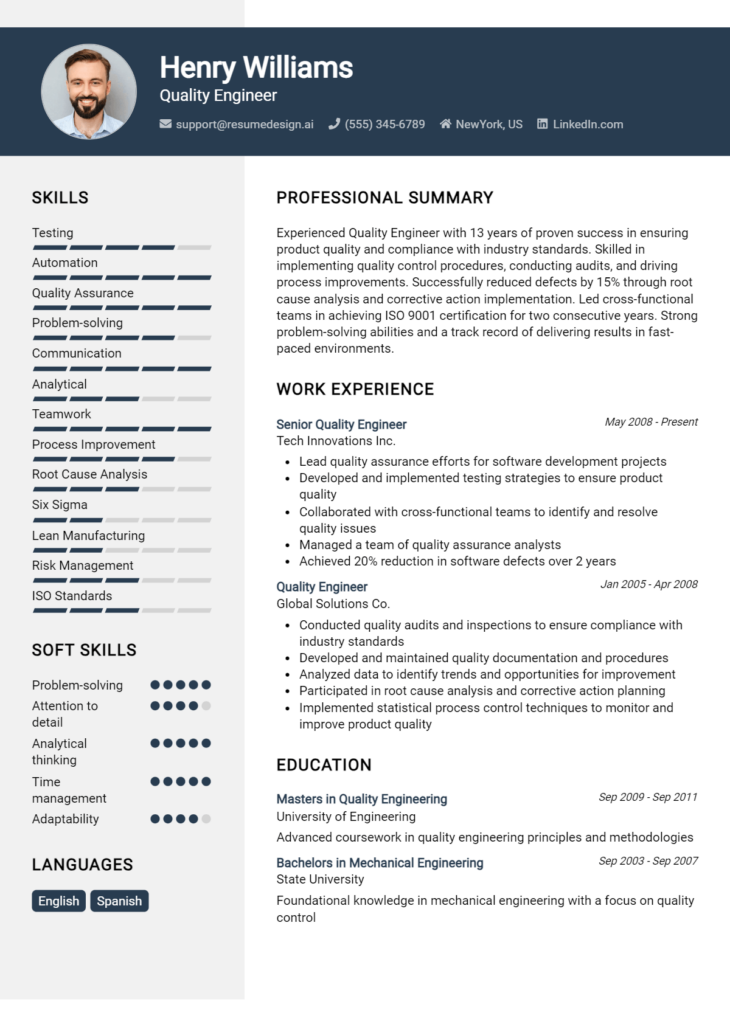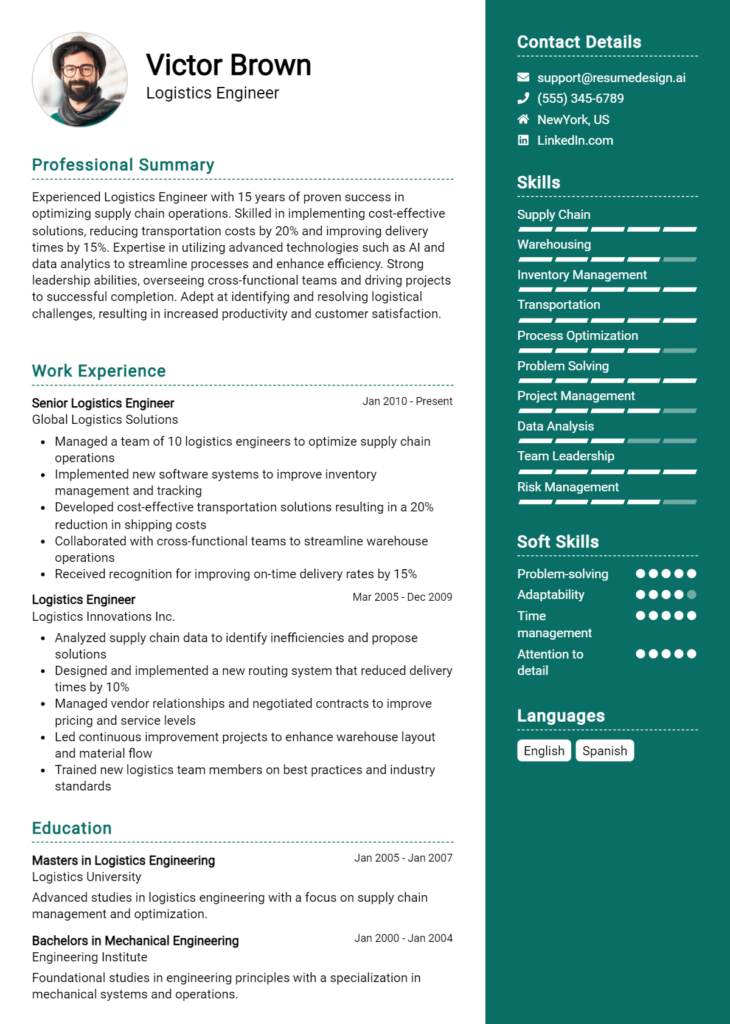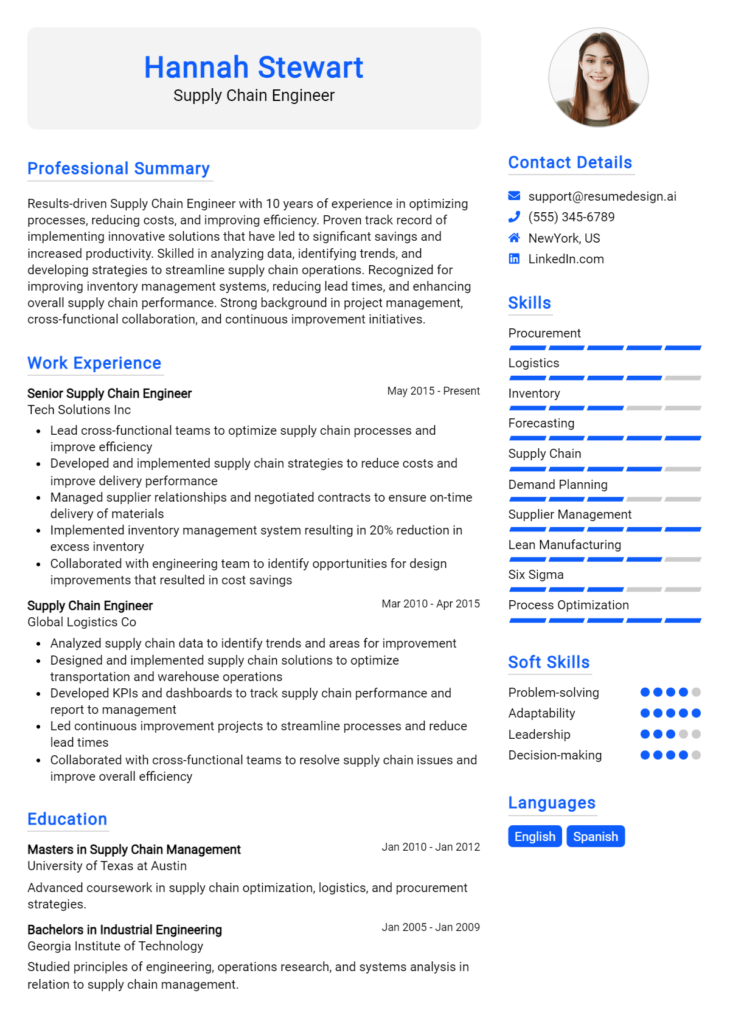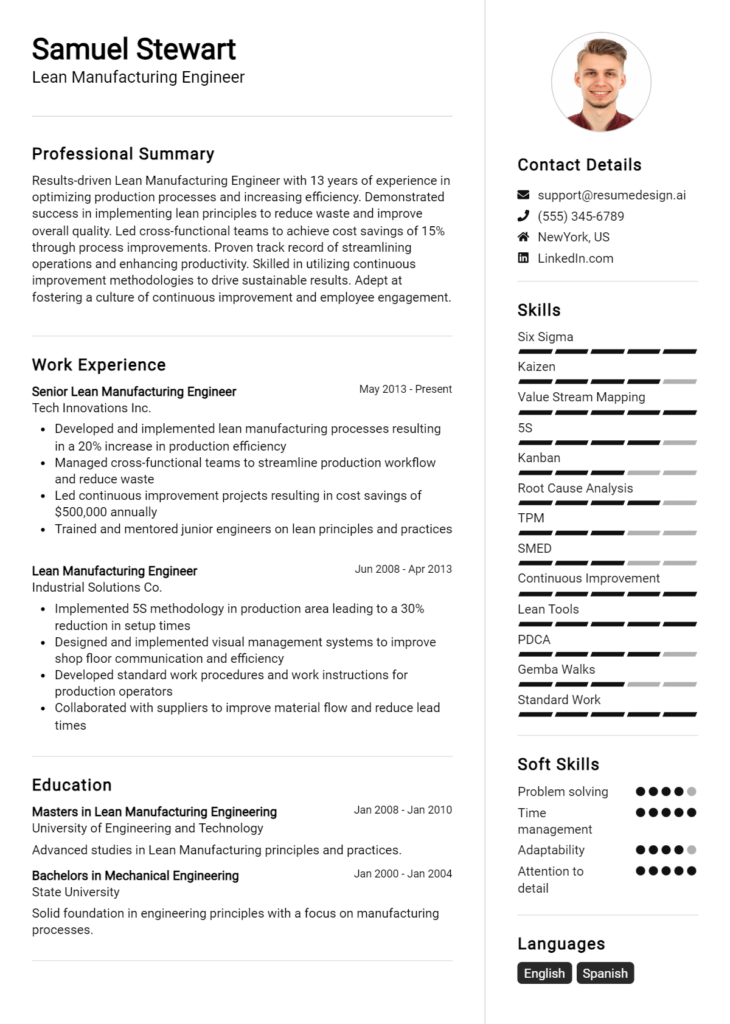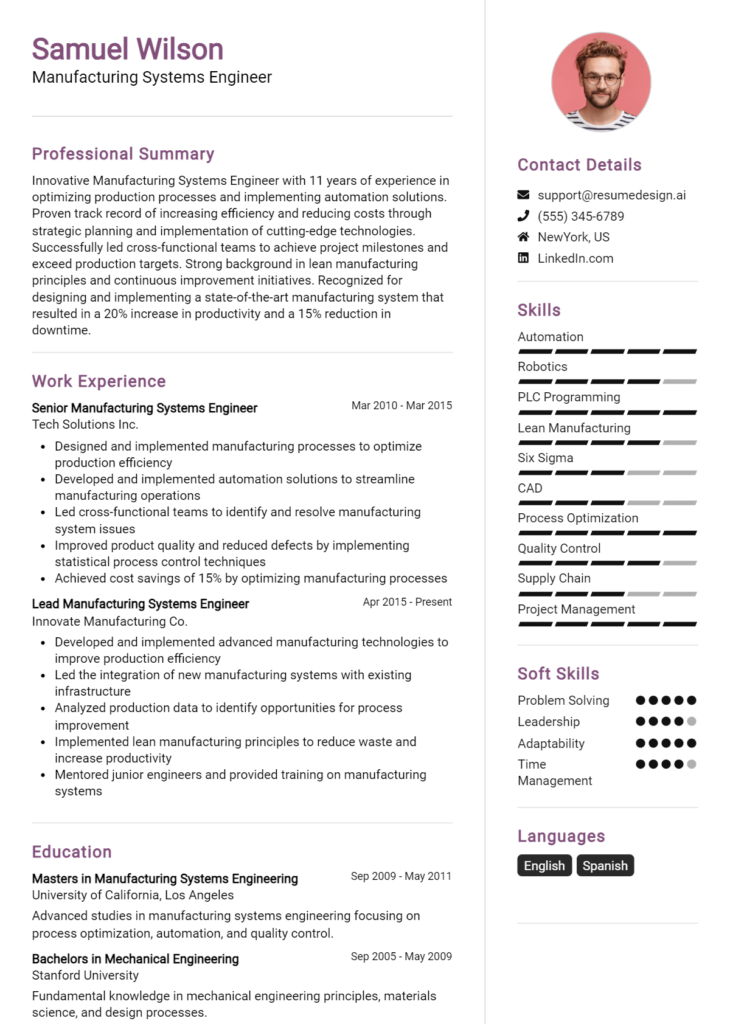Operations Research Engineer Core Responsibilities
An Operations Research Engineer plays a crucial role in optimizing complex processes across various departments, utilizing analytical methods to solve operational challenges. Key responsibilities include modeling and simulation, data analysis, and developing algorithms to enhance decision-making. Essential skills encompass technical proficiency in mathematics and statistics, operational insights, and strong problem-solving abilities. These competencies are vital for achieving organizational goals, and a well-structured resume can effectively highlight these qualifications, showcasing the candidate's potential impact.
Common Responsibilities Listed on Operations Research Engineer Resume
- Develop and implement mathematical models for process optimization.
- Conduct data analysis to inform strategic decision-making.
- Collaborate with cross-functional teams to identify operational improvements.
- Utilize simulation techniques to analyze system performance.
- Design and test algorithms for resource allocation.
- Interpret complex datasets to derive actionable insights.
- Prepare comprehensive reports and presentations for stakeholders.
- Continuously monitor key performance indicators (KPIs).
- Assist in the development of software tools for operational analysis.
- Stay updated on industry trends and emerging technologies.
- Provide training and support for teams on analytical tools.
High-Level Resume Tips for Operations Research Engineer Professionals
In the competitive field of Operations Research, a well-crafted resume is crucial for professionals looking to make a lasting impression on potential employers. Your resume is often the first point of contact, and it needs to compellingly showcase your skills, achievements, and problem-solving capabilities that are vital in this analytical domain. A thoughtfully designed resume not only highlights your technical proficiency but also reflects your understanding of the industry’s demands. This guide will provide practical and actionable resume tips specifically tailored for Operations Research Engineer professionals, helping you stand out in a crowded job market.
Top Resume Tips for Operations Research Engineer Professionals
- Tailor your resume to the specific job description by incorporating relevant keywords and phrases that align with the position.
- Highlight your educational background, especially if you possess advanced degrees or certifications in operations research, data analysis, or related fields.
- Showcase relevant work experience, focusing on roles that involved data analysis, optimization, and decision-making processes.
- Quantify your achievements with specific metrics, such as cost savings, efficiency improvements, or project outcomes to demonstrate your impact.
- Emphasize your proficiency in industry-specific tools and software such as MATLAB, R, Python, or optimization software.
- Include any experience with machine learning or statistical analysis, as these skills are increasingly valuable in operations research.
- Demonstrate your ability to work collaboratively in interdisciplinary teams, as operations research often involves cross-functional collaboration.
- Keep your resume concise and well-organized, ideally fitting onto one page while ensuring that the most relevant information is easily accessible.
- Incorporate a summary statement at the top of your resume that succinctly outlines your expertise and career goals.
- Proofread your resume multiple times to eliminate errors and ensure a professional presentation, as attention to detail is crucial in operations research.
By implementing these tips, you can significantly increase your chances of landing a job in the Operations Research Engineer field. A resume that effectively showcases your skills, experiences, and accomplishments will not only capture the attention of hiring managers but also set you apart as a strong candidate ready to tackle complex problems and drive data-informed decisions.
Why Resume Headlines & Titles are Important for Operations Research Engineer
In the competitive field of operations research, a well-crafted resume headline or title serves as the first impression for hiring managers. It acts as a succinct summary of a candidate's qualifications, skills, and experience, allowing them to quickly assess the relevance of the applicant for the role. A strong headline grabs attention and invites further reading, while also establishing the candidate's expertise in operations research. To maximize impact, the headline should be concise, directly relevant to the position, and encapsulate the essence of the candidate's professional identity. When done effectively, it can set the tone for the entire resume and make a memorable statement.
Best Practices for Crafting Resume Headlines for Operations Research Engineer
- Keep it concise: Aim for one to two impactful phrases.
- Be specific: Tailor the headline to the job description and highlight relevant skills.
- Use action-oriented language: Employ verbs that convey your expertise and achievements.
- Highlight key qualifications: Focus on your most significant strengths and experiences.
- Incorporate keywords: Use industry-specific terms that align with the job posting.
- Differentiate yourself: Avoid clichés and generic phrases; stand out from the competition.
- Align with career goals: Ensure the headline reflects your aspirations and the role you seek.
- Maintain professionalism: Use a formal tone suitable for the industry.
Example Resume Headlines for Operations Research Engineer
Strong Resume Headlines
"Data-Driven Operations Research Engineer Specializing in Optimization and Simulation Techniques"
“Experienced Operations Research Engineer with a Proven Track Record in Supply Chain Optimization”
“Innovative Operations Research Professional with Expertise in Quantitative Analysis and Decision Support Systems”
“Results-Oriented Operations Research Engineer Delivering Efficiency Improvements Through Advanced Modeling Techniques”
Weak Resume Headlines
“Operations Research Engineer Looking for a Job”
“Engineer with Experience”
The strong headlines are effective because they immediately convey specific skills, experiences, and areas of expertise relevant to the operations research field, making it clear why the candidate would be a valuable addition to any team. In contrast, the weak headlines fail to impress due to their vagueness and lack of detail, leaving hiring managers with little insight into the candidate's qualifications or motivations. A powerful headline captures attention and sets a positive tone for the rest of the resume, while a weak one may lead to the candidate being overlooked.
Writing an Exceptional Operations Research Engineer Resume Summary
A resume summary is a crucial component for an Operations Research Engineer, as it serves as the first impression a hiring manager receives of a candidate's qualifications. A well-crafted summary quickly captures attention by highlighting key skills, relevant experience, and notable accomplishments that align with the job role. This concise and impactful section can differentiate a candidate in a competitive job market, making it essential to tailor the summary specifically to the position being applied for.
Best Practices for Writing a Operations Research Engineer Resume Summary
- Quantify Achievements: Use numbers and metrics to demonstrate the impact of your work, such as increased efficiency or cost savings.
- Focus on Skills: Highlight specific technical and analytical skills relevant to operations research, such as statistical analysis, optimization techniques, and programming languages.
- Tailor for the Job Description: Customize your summary to reflect the keywords and requirements mentioned in the job posting.
- Be Concise: Aim for 3-5 sentences that capture your professional essence without overwhelming the reader.
- Showcase Relevant Experience: Briefly mention past roles or projects that directly relate to operations research tasks.
- Use Action Verbs: Start sentences with strong action verbs to convey a sense of proactivity and achievement.
- Demonstrate Problem-Solving Skills: Include examples of how you've effectively addressed challenges in previous roles.
- Maintain Professional Tone: Ensure your summary reflects professionalism and aligns with industry standards.
Example Operations Research Engineer Resume Summaries
Strong Resume Summaries
Results-driven Operations Research Engineer with over 5 years of experience in optimizing production processes, achieving a 20% reduction in costs through data-driven decision-making and advanced statistical analysis.
Dynamic Operations Research Engineer skilled in developing predictive models that improved inventory management efficiency by 30%, leveraging expertise in Python and MATLAB to solve complex logistical challenges.
Detail-oriented Operations Research Engineer with a proven track record in supply chain optimization, successfully implementing strategies that enhanced delivery times by 15% and reduced waste by 25% within a leading manufacturing firm.
Innovative Operations Research Engineer with a Master’s degree in Industrial Engineering and experience in simulation modeling, recognized for increasing throughput by 40% in a high-volume production environment through effective process redesign.
Weak Resume Summaries
Operations Research Engineer with experience looking for a new opportunity. I have skills in data analysis and problem-solving.
Dedicated professional seeking to contribute to an organization as an Operations Research Engineer. I have worked in various settings and can adapt to different tasks.
The strong resume summaries are considered effective because they provide specific achievements and quantifiable results, showcasing relevant skills and experiences that directly tie to the Operations Research Engineer role. In contrast, the weak summaries lack detail and specificity, making them too vague and generic to stand out to hiring managers. They do not highlight measurable outcomes or demonstrate a clear understanding of the qualifications needed for the position.
Work Experience Section for Operations Research Engineer Resume
The work experience section of an Operations Research Engineer resume is crucial for demonstrating a candidate's technical skills and their ability to manage teams effectively while delivering high-quality products. This section not only highlights relevant accomplishments but also showcases how the candidate has applied their analytical and problem-solving abilities in real-world scenarios. By quantifying achievements and aligning experiences with industry standards, candidates can effectively illustrate their value to potential employers and differentiate themselves in a competitive job market.
Best Practices for Operations Research Engineer Work Experience
- Highlight specific technical skills relevant to operations research, such as optimization, statistical analysis, and simulation modeling.
- Quantify achievements with metrics (e.g., percentage improvements, cost savings) to demonstrate impact.
- Use action verbs to describe responsibilities and accomplishments, showcasing initiative and leadership.
- Align experiences with industry standards and practices to show familiarity with the field.
- Include collaborative projects that reflect the ability to work in multidisciplinary teams.
- Tailor the work experience section to the job description, focusing on the most relevant experiences.
- Incorporate specific tools and technologies used, such as programming languages and software applications.
- Keep descriptions concise yet informative, avoiding jargon that may not be understood by all readers.
Example Work Experiences for Operations Research Engineer
Strong Experiences
- Led a cross-functional team to develop a predictive analytics model that increased production efficiency by 30%, resulting in an annual cost savings of $250,000.
- Implemented a linear programming solution for resource allocation that reduced waste by 25% and improved overall project timelines by 15%.
- Designed and executed a simulation study for a logistics network, enabling a 20% improvement in delivery times and enhancing customer satisfaction ratings.
- Collaborated with IT and data science teams to integrate machine learning algorithms into operational workflows, boosting data-driven decision-making capabilities.
Weak Experiences
- Worked on various projects related to operations research.
- Assisted team members with tasks and analyses.
- Helped in improving processes without specific metrics or outcomes.
- Participated in meetings to discuss project ideas.
The examples provided illustrate the distinction between strong and weak experiences in an Operations Research Engineer resume. Strong experiences are characterized by specific, quantifiable outcomes and demonstrate the candidate's technical expertise, leadership skills, and ability to collaborate effectively on impactful projects. In contrast, weak experiences lack detail, measurable results, and fail to showcase significant contributions, making them less compelling to hiring managers.
Education and Certifications Section for Operations Research Engineer Resume
The education and certifications section of an Operations Research Engineer resume plays a critical role in showcasing the candidate's academic background and professional qualifications. This section not only highlights the degrees earned and institutions attended but also emphasizes industry-relevant certifications and continuous learning efforts that are essential for staying competitive in the field. Providing relevant coursework, specialized training, and certifications can significantly enhance the candidate's credibility, demonstrating a strong alignment with the job requirements and an ongoing commitment to professional development.
Best Practices for Operations Research Engineer Education and Certifications
- Include degrees from accredited institutions relevant to operations research, engineering, or mathematics.
- List certifications from recognized organizations, such as Six Sigma, PMP, or specific data analysis certifications.
- Highlight relevant coursework that demonstrates expertise in optimization, statistics, or simulation modeling.
- Ensure the most recent education and certifications are listed first, prioritizing relevance to the position.
- Incorporate any specialized training or workshops that enhance skills pertinent to operations research.
- Use clear and concise language to describe each educational achievement and certification.
- Be mindful of formatting for easy readability, using bullet points and consistent styles.
- Regularly update this section to reflect new qualifications and learning experiences.
Example Education and Certifications for Operations Research Engineer
Strong Examples
- M.S. in Operations Research, Georgia Institute of Technology, 2022
- Certified Analytics Professional (CAP), INFORMS, 2023
- Relevant Coursework: Statistical Analysis, Linear Programming, Simulation Modeling
- Lean Six Sigma Green Belt Certification, 2021
Weak Examples
- B.A. in English Literature, State University, 2018
- Certification in Basic Computer Skills, 2019
- Relevant Coursework: Introduction to Psychology, Art History
- High School Diploma, Anytown High School, 2015
The examples provided illustrate a clear distinction between strong and weak qualifications. Strong examples such as an M.S. in Operations Research and industry-recognized certifications demonstrate relevant expertise and commitment to the field, directly aligning with the requirements of an Operations Research Engineer. In contrast, weak examples reflect a lack of relevance to the position, showcasing degrees and certifications that do not contribute to the candidate's qualifications in operations research, thereby undermining their credibility in a competitive job market.
Top Skills & Keywords for Operations Research Engineer Resume
As an Operations Research Engineer, showcasing the right skills in your resume is crucial for standing out in a competitive job market. Employers seek candidates who not only possess technical expertise but also demonstrate strong interpersonal abilities. These skills highlight your capacity to analyze complex problems, devise effective solutions, and collaborate with cross-functional teams. By strategically incorporating both hard and soft skills into your resume, you can effectively communicate your qualifications and readiness for the challenges of the role. For a comprehensive overview of how to highlight these skills effectively, consider the following lists:
Top Hard & Soft Skills for Operations Research Engineer
Soft Skills
- Analytical Thinking
- Problem Solving
- Communication Skills
- Team Collaboration
- Time Management
- Adaptability
- Critical Thinking
- Leadership
- Attention to Detail
- Conflict Resolution
Hard Skills
- Statistical Analysis
- Optimization Techniques
- Simulation Modeling
- Data Mining
- Operations Research Software (e.g., CPLEX, GAMS)
- Programming Languages (e.g., Python, R, MATLAB)
- Machine Learning Algorithms
- Project Management
- Supply Chain Management
- Database Management Systems
In addition to these skills, relevant work experience in the field will further enhance your resume, demonstrating your practical application of these competencies in real-world scenarios.
Stand Out with a Winning Operations Research Engineer Cover Letter
As an enthusiastic and detail-oriented Operations Research Engineer, I am excited to apply for the position at [Company Name]. With a strong foundation in mathematical modeling, optimization techniques, and data analysis, I am confident in my ability to contribute effectively to your team. My educational background in Industrial Engineering, combined with hands-on experience in applying operations research principles to real-world problems, has equipped me with the skills necessary to tackle complex challenges and drive efficiency within your organization.
In my previous role at [Previous Company Name], I successfully led a project aimed at reducing supply chain costs by 15% through the implementation of advanced optimization algorithms and predictive analytics. By collaborating with cross-functional teams, I was able to identify key bottlenecks and develop data-driven solutions that not only improved operational efficiency but also enhanced overall customer satisfaction. My ability to communicate complex technical concepts to non-technical stakeholders has been essential in ensuring that project objectives align with business goals.
I am particularly drawn to [Company Name] because of its commitment to innovation and excellence in operations management. I am eager to bring my expertise in simulation modeling and decision analysis to your team, contributing to the development of strategic initiatives that further enhance your competitive edge in the market. I am excited about the possibility of working in an environment that values continuous improvement and embraces cutting-edge technologies.
Thank you for considering my application. I am looking forward to the opportunity to discuss how my background, skills, and enthusiasms align with the goals of [Company Name]. I am eager to contribute to your team and support your mission of delivering exceptional results through informed decision-making and operational efficiency.
Common Mistakes to Avoid in a Operations Research Engineer Resume
When crafting a resume for the Operations Research Engineer role, it's crucial to present your skills and experiences in the best light possible. However, many candidates make common mistakes that can undermine their application and diminish their chances of landing an interview. Here are some of the most frequent pitfalls to avoid:
Lack of Specificity: Failing to provide specific examples of projects or results can make your resume vague. Instead, quantify your achievements, such as "improved process efficiency by 20% through optimization techniques."
Ignoring Keywords: Not incorporating relevant industry keywords can lead to your resume being overlooked by Applicant Tracking Systems (ATS). Research the job description and include terms that reflect the required skills and tools.
Overcomplicating Language: Using overly technical jargon or complex language can confuse hiring managers. Strive for clarity and conciseness; explain your contributions in straightforward terms.
Neglecting Technical Skills: Operations research relies heavily on technical skills. Ensure you highlight your proficiency in relevant software and methodologies, such as linear programming, simulation, or data analysis tools.
Poor Formatting: A cluttered or unprofessional layout can detract from your qualifications. Use clear headings, bullet points, and consistent fonts to enhance readability and make a positive impression.
Omitting Soft Skills: While technical abilities are vital, soft skills like communication, teamwork, and problem-solving are equally important for an Operations Research Engineer. Demonstrate how you’ve applied these skills in collaborative settings.
Inaccurate Job Titles or Dates: Misrepresenting your previous job titles or employment dates can lead to distrust. Always provide accurate information to maintain credibility.
Failing to Tailor the Resume: Sending a generic resume without tailoring it to the specific job can be a major misstep. Customize your resume to reflect the requirements and values of the organization you are applying to, showcasing how you align with their needs.
Conclusion
As an Operations Research Engineer, your role is pivotal in optimizing processes and making data-driven decisions that enhance efficiency across various industries. This article has highlighted the essential skills, tools, and techniques that are crucial for success in this field, emphasizing the importance of analytical thinking, problem-solving capabilities, and proficiency in statistical software.
To ensure that your resume reflects these key competencies effectively, it's time to take a closer look at your document. A well-structured resume can significantly impact your job search by making you stand out to potential employers. We encourage you to review your Operations Research Engineer resume and consider updating it with the insights gained from this article.
To assist you in this process, we offer a variety of resources to help you create a compelling resume. Check out our resume templates for a professional layout that showcases your qualifications. If you prefer a more hands-on approach, our resume builder simplifies the process of crafting your resume from scratch. For inspiration, explore our resume examples that demonstrate effective ways to present your experience and skills. Additionally, don’t forget to enhance your application with our cover letter templates to make a memorable first impression.
Take action now and ensure your resume reflects the expertise and potential you bring as an Operations Research Engineer. Your next opportunity awaits!

